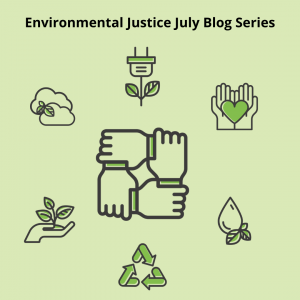The Environmental Justice Movement: Definitions and Distinctions

Emory’s Office of Sustainability Initiatives is recognizing July as Environmental Justice (EJ) Month. We would like to start the conversation by focusing on language – definitions of terms that seem the same but all address nuanced aspects of environmental justice.
The Environmental Protection Agency defines environmental justice as “the fair treatment and meaningful involvement of all people regardless of race, color, national origin, or income with respect to the development, implementation, and enforcement of environmental laws, regulation, and policies” (EPA, 2018). Often, what we see in America is environmental injustice, which is “the disproportionate exposure of communities of color and the poor to pollution, and its concomitant effects on health and environment, as well as the unequal environmental protection and environmental quality provided through laws, regulations, governmental programs, enforcement, and policies” (Maantay, 2002).
Environmental justice is a movement that began as a response to issues like environmental racism and inequity primarily by people of color who wanted to address the inequity of environmental protection in their communities (EPA, 2017). Since the beginning of the EJ movement, networks have coalesced formally and informally to acknowledge and to begin addressing the historical injustices.
Environmental justice is different from the idea of intersectional environmentalism, but it is the foundation of this concept. Leah Thomas, environmentalist and social justice advocate, defines intersectional environmentalism as an inclusive version of environmentalism that identifies the ways in which injustices happening to marginalized communities and the earth are interconnected. Intersectional environmentalists connect and center justice for all people and for the planet together. Therefore, intersectional environmentalism is key in achieving environmental justice.
As climate change continues, the impacts are not and will not be felt equally or fairly, which is why we are seeing a new movement known as climate justice. Climate justice focuses on the climate change crisis “through a human rights lens and on the belief that by working together we can create a better future for present and future generations” (UN, 2019). The climate justice movement works with and for those least responsible for global emissions, who will most likely continue to be disproportionately affected by extreme weather, rising sea levels, poorer air quality, and rising global temperatures.
This month, we will share a short blog series about some of the history of the environmental justice movement nationally, locally, and at Emory. Additionally, we will highlight calls to action and voices from the movement. As individuals, we challenge our sustainability network to educate ourselves on the importance of environmental justice. To do this, we will need to ask questions and learn about the systems and people behind the generation, distribution, usage of, and overall financial and social costs of energy, waste, water, transportation, health and food systems. We will need to assess where we each have blind spots that are barriers to transforming these systems into just systems. We will need to support local EJ initiatives and advocates, and we need to vote in local and national elections for candidates that will support the EJ movement. Local primary run-off elections are coming up, so start researching today!
Sources Cited
Environmental Protection Agency (EPA). (2017, June 2). Environmental Justice Timeline. https://www.epa.gov/environmentaljustice/environmental-justice-timeline
Environmental Protection Agency (EPA). (2018, November 7). Learn About Environmental Justice. https://www.epa.gov/environmentaljustice/learn-about-environmental-justice
Maantay, J. (2002). Mapping environmental injustices: Pitfalls and potential of geographic information systems in assessing environmental health and equity. Environmental Health Perspectives, 110(Suppl 2), 161-171. doi:10.1289/ehp.02110s2161
United Nations (UN). (2019, May 31). Climate Justice. https://www.un.org/sustainabledevelopment/blog/2019/05/climate-justice/
